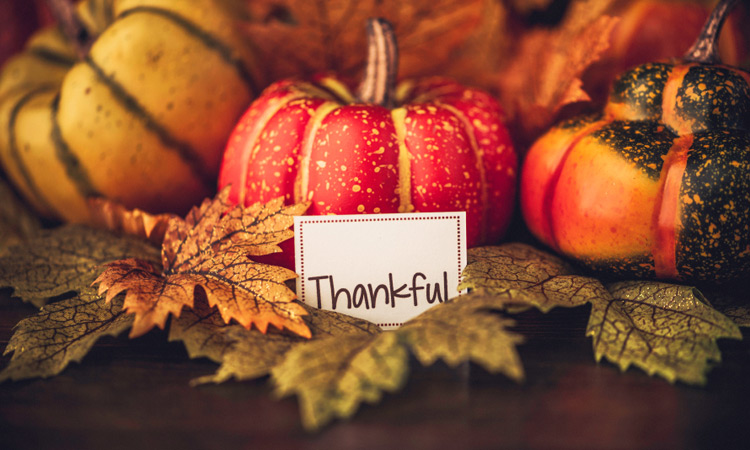 How can we get 6 billion people around the world to practice Thanksgiving? asked the Greater Good Science Center at the University of California, Berkeley. When I first heard about this amazing goal, I just knew I had to learn more. It turns out the center, in collaboration with the University of California, Davis, has launched a $5.6 million, three-year project, Expanding the Science and Practice of Gratitude, with the goal of increasing the scientific database of gratitude and promoting “evidence-based practices of gratitude in medical, educational, and organizational settings and in schools, workplaces, homes and communities.” On top of that, they aim to get people involved in a larger cultural conversation about the importance of gratitude.
How can we get 6 billion people around the world to practice Thanksgiving? asked the Greater Good Science Center at the University of California, Berkeley. When I first heard about this amazing goal, I just knew I had to learn more. It turns out the center, in collaboration with the University of California, Davis, has launched a $5.6 million, three-year project, Expanding the Science and Practice of Gratitude, with the goal of increasing the scientific database of gratitude and promoting “evidence-based practices of gratitude in medical, educational, and organizational settings and in schools, workplaces, homes and communities.” On top of that, they aim to get people involved in a larger cultural conversation about the importance of gratitude.
Gratitude: ‘the moral memory of mankind’
If you think gratitude is just about saying “thank you,” as a way to show appreciation, think again. There is a lot of power behind those words! Robert Emmons, a leading scientific expert on gratitude, explains in a Greater Good essay just why Gratitude Is Good. Gratitude is “an affirmation of goodness,” he says. “We affirm that there are good things in the world, gifts and benefits we’ve received.”
Additionally, “we recognize that the sources of this goodness are outside of ourselves. We acknowledge that other people—or even higher powers, if you’re of a spiritual mindset—gave us many gifts, big and small, to help us achieve the goodness in our lives.”
Emmons and other researchers identify the social aspect as being especially important to gratitude. “I see it as a relationship-strengthening emotion,” he says, “because it requires us to see how we’ve been supported and affirmed by other people.”
The center notes that “gratitude encourages us not only to appreciate gifts but to repay them (or pay them forward); the sociologist Georg Simmel called it the moral memory of mankind.” Beautifully put—Thank you Georg Simmel!
Reaping the benefits
Over the past decade, the center says scientists have begun to research gratitude. So, why is this important? Because studies have documented social, physical and psychological benefits of gratitude. Here’s what the center says are the top research-based reasons for practicing gratitude:
- Gratitude makes us happy and boosts feelings of optimism, joy, pleasure, enthusiasm and more
- Gratitude reduces anxiety and depression
- Studies suggest that gratitude strengthens the immune system, lowers blood pressure, reduces symptoms of illness, aches and pains and encourages us to exercise more
- Counting blessings instead of sheep makes us get more hours of sleep nightly and feel more refreshed upon awakening
- Gratitude increases resiliency and has also been found to help people recover from trauma
- Gratitude strengthens relationships and can help partners who feel and express gratitude be more satisfied with their relationship
- Gratitude promotes forgiveness—even between ex-spouses after a divorce
- Gratitude helps kids gain greater life satisfaction, more positive emotion and more connection to community
- Gratitude is good for schools. Studies suggest it makes students feel better about their schools as well as teachers feeling more satisfied and accomplished
Cultivating a garden of gratitude
Want to bring more gratitude in your life? Here are some practices that Emmons says can help us do just that:
Keep a gratitude journal. Write down all “the gifts, grace, benefits, and good things you enjoy. Setting aside time on a daily basis to recall moments of gratitude associated with ordinary events, your personal attributes, or valued people in your life gives you the potential to interweave a sustainable life theme of gratefulness.”
Vow to practice gratitude. Research, he says, “shows that making an oath to perform a behavior increases the likelihood that the action will be executed. Therefore, write your own gratitude vow, which could be as simple as I vow to count my blessings each day, and post it somewhere where you will be reminded of it every day.”
Watch your language. Grateful people, he says “have a particular linguistic style that uses the language of gifts, givers, blessings, blessed, fortune, fortunate, and abundance. In gratitude, you should not focus on how inherently good you are, but rather on the inherently good things that others have done on your behalf.”
Go through the motions. Simply by going “through grateful motions, the emotion of gratitude should be triggered. Grateful motions include smiling, saying thank you, and writing letters of gratitude.”
Grateful for gratitude
It seems that for too long, we’ve taken gratitude for granted. Because being grateful offers so many benefits important to our lives, I agree: We should practice Thanksgiving every day. So, have you said “thank you” today? Oh wait, before I forget, one last thing…thanks for stopping by.

Rose Caiola
Inspired. Rewired.
To find out more about Rose’s thoughts on how to live a happier life, click here


